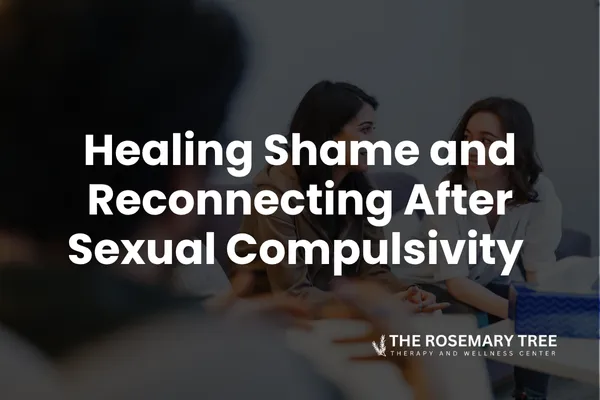
Healing Shame and Reconnecting After Sexual Compulsivity: Moving from Avoidance to Accountability
When Shame Takes Over
After betrayal or compulsive sexual behavior comes to light, many couples describe a familiar pattern, waves of anger and sadness give way to something quieter, heavier, and harder to name: shame.
For the partner who acted out, shame whispers, “You are broken. You don’t deserve forgiveness.” For the betrayed partner, it says, “You weren’t enough. You should have seen this coming.”
Shame isolates both people. It keeps them stuck in silence, afraid to talk, afraid to hope, afraid to feel. But real healing begins the moment shame is spoken out loud, in a space safe enough to hold it.
Understanding the Role of Shame in Sexual Compulsivity
Shame is at the root of nearly every pattern of sexual compulsivity. It often begins long before the relationship, formed by early messages about worth, intimacy, or failure.
For some, compulsive behavior becomes a way to numb pain, loneliness, or insecurity. For others, it’s a misguided way to regain a sense of control. But once secrecy enters a marriage, shame grows exponentially, feeding avoidance, lying, and withdrawal.
The cycle looks like this:
Shame creates pain.
The pain drives compulsive behavior for relief.
Relief is followed by more shame.
The secrecy deepens.
And around it goes, until the relationship itself becomes collateral damage.
How Shame Affects Both Partners
For the partner who acted out:
Shame creates self-loathing and avoidance. You may shut down emotionally, afraid to face your partner’s eyes or answer their questions. The guilt can become paralyzing, leading to more hiding instead of healing.
For the betrayed partner:
Shame twists pain into self-blame. You may ask, “Was I not enough?” or “Did I cause this?” The betrayal becomes internalized, making it harder to feel secure, desirable, or worthy again.
This is the cruel truth about shame, it disconnects both people from each other and from themselves.
Moving from Avoidance to Accountability
The turning point comes when shame is replaced with accountability. Accountability is not about punishment or perfection; it’s about honesty, consistency, and ownership.
It means saying, “I did this, I understand the impact, and I’m willing to repair it.”
It means sitting in discomfort long enough to build empathy.
It means showing your partner change through actions, not promises.
Accountability allows both partners to begin trusting reality again, what’s said, what’s seen, what’s felt.
How Intensives Help Break the Shame Cycle
Our Accelerated Deep-Work Therapy Intensives are designed for couples who can no longer move forward in short sessions. When the pain is too deep, the time too limited, and the patterns too stuck, a concentrated, structured approach becomes necessary.
During an intensive, couples have the space to:
Identify how shame shows up in both partners
Explore the root causes of compulsive behavior
Learn tools for emotional regulation and communication
Rebuild connection through empathy-based exercises
Create a recovery plan grounded in truth and repair
This is where couples begin to experience hope again, not because everything is fixed, but because the walls of avoidance start to fall.
Why Compassion Is the Antidote to Shame
Compassion and accountability must coexist. Without accountability, compassion becomes enabling. Without compassion, accountability becomes punishment.
In therapy intensives, couples learn to balance both. The partner who acted out learns to face truth without collapsing into guilt, and the betrayed partner learns to hold boundaries while still allowing moments of connection.
This balance, firm truth and soft compassion, is where healing actually begins.
Rebuilding Intimacy Through Vulnerability
Once shame is named and accountability begins, something unexpected happens: vulnerability returns.
Real intimacy is not built on perfection or performance, it’s built on truth. When both partners begin to share their pain honestly and are met with empathy instead of judgment, connection deepens.
Rebuilding intimacy after betrayal is not about rushing physical closeness. It’s about emotional safety, knowing that the person sitting across from you can hold your truth without turning away.
What Healing Looks Like
Healing from shame and compulsivity is gradual but powerful. Couples begin to notice small moments that mark change:
Conversations that once ended in yelling now end in understanding.
The acting-out partner takes initiative for honesty instead of waiting to be caught.
The betrayed partner feels safe enough to ask questions again.
Laughter or tenderness begins to return, quietly but steadily.
Each moment of truth shared safely becomes a brick in the foundation of rebuilding trust.
When You’re Both Tired but Not Done
Many couples who come to this stage feel exhausted, mentally, emotionally, spiritually. They may feel like they’ve tried everything and nothing has worked.
That exhaustion doesn’t mean the relationship is over. It means it’s time for a different approach, one that addresses the full depth of pain and the human need to be seen and understood.
You don’t have to face shame alone. It loses its power the moment it’s shared in safety.
Final Thoughts
Shame thrives in silence, but healing begins in honesty. You can move from hiding to healing, from fear to accountability, and from shame to reconnection.
If you know you need this, click here to submit an inquiry and we will get back to you right away to get the process started for you. This is an in-person service, but you can still reach out and have a conversation with us. We can talk with you and help you explore whether this next step feels right for you.


